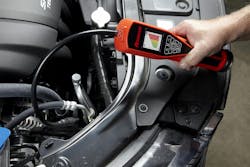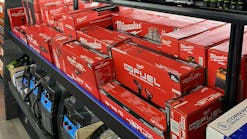Spring is in the air. The snow is melting. The sun is staying out later and longer, and it won’t be long until the season of summer road trips begins. This changing of the seasons may also mean a change in sales tactics for some mobile distributors, or perhaps just a greater push when it comes to A/C tool and equipment sales.
However, Cornwell Quality Tools distributor, Elias Valdovinos, prefers to take a more holistic approach to selling A/C tools and equipment. In the past year, Valdovinos has sold a number of both R-134a and R-1234yf machines, regardless of the season. His secret to making these sales is simple – observation.
“Every time I walk into a shop, I'm always observing and trying to decipher what they need,” he says. “Sometimes the shops don't even know they need [an A/C machine] until you bring it up to them. Just being observant of your surroundings can make the sale for you.”
Though observation is a key factor in making sales, mobile distributors should also have a solid understanding of the tools and equipment they’re selling. This understanding should go beyond the basics of each product’s features and benefits or the models offered by different manufacturers, distributors should be aware of any laws or regulations surrounding the products, especially when it comes to A/C tools and equipment.
The evolution of A/C equipment
As of 2021, the installation of R-134a refrigerant in passenger cars and light trucks was prohibited by the Environmental Protection Agency (EPA). Instead, R-1234yf is now in use due to its low Global Warming Potential (GWP). Comparatively, R-134a has a GWP of about 1,400 while R-1234yf comes in at less than 4. With this shift came the need to introduce an A/C machine that could handle R-1234yf refrigerant and eventually, arguably the most popular machine, one that could handle both.
However, this isn’t the only update that distributors should be aware of – SAE certifications are another important factor. In the last 10-15 years SAE has put two regulations in place, SAE J2788 and SAE J2843.
“SAE has always kind of required certifications on the recycling machines,” explains Jeff Wiedecke, national sales manager for Mastercool, Inc. “Years ago it was about 89 percent of the refrigerant you had to get out. Then the newer SAE regulations required you to get 95 percent of the refrigerant out.”
SAE J2788 refers to R-134a machines and SAE J2843 to the R-1234yf machines. These regulations help ensure that all the moisture is being removed from the vehicle’s A/C system which could potentially lead to future damage.
“[If the machine] doesn't have to get 95 percent or more of the refrigerant out and it doesn't have the certified filters, which make sure you're removing all the moisture,” Wiedecke says, “[then] you have a possibility of hydrochloric and/or hydrofluoric acid being created that could eat away from the inside of the system itself.”
Potentially damaging a customer’s vehicle by using a non-certified machine isn’t ideal. Additionally, Wiedecke notes that if a shop is using a machine that isn’t SAE-certified, they could wind up with around a $40,000 fine from the EPA.
Looking ahead, with the advancements being made on newer model vehicles’ A/C systems, diagnostic tools may be taking the lead for some A/C repairs.
Robinair’s Senior Product Manager, Tim Wagaman says, “Modern A/C systems are driving greater efficiency with innovative climate control features that maintain ideal in-cabin temperatures without the unit running any more than it needs to. With this advanced efficiency comes a host of new sensor elements that are seeing diagnostic tools play a greater role in standard A/C service.”
The Effects of EVs on A/C
Though largely there is little variance between internal combustion engine (ICE), hybrid, and electric vehicle (EV) A/C systems, whether they’re R-134a or R-1234yf, the biggest difference is the compressor.
“It's electrically driven,” explains Wiedecke, “so you have to be using POE oil which is non-conductive instead of PAG oil which is used in standard cars.”
Due to it being non-conductive, this makes it a safer choice of oil to use in a high-voltage compressor. Additionally, POE oil has better moisture encapsulating qualities that will protect the electrically driven compressor much better, Wiedecke notes.
Related articles:
Valante Pappas, the National Account Manager for FJC, notes that their oils are non-conductive, making them safe to use in EVs.
“They’re designed to work in both belt-driven and electric systems,” Pappas says, “making them a versatile option for a variety of vehicles.”
Servicing EVs and hybrid vehicles is also a bit different for those with R-1234yf systems. When using an A/C machine technicians are not allowed to automatically inject the oil as they can for vehicles with R-134a systems.
“By law, the machines are prevented from having onboard oil injection,” explains Justin Fisette, senior product marketing manager for Robinair. “The semi-automatic machines will perform most of the service needed, with a technician having to manually inject oil to lubricate the system upon recharge completion.”
Apart from the difference in the oil used and slightly more manual servicing needs, the frequency of part replacement between ICE, hybrid, and EVs varies quite a bit. In a survey done by Endeavor Business Media’s IMR group, they found that between 2019 to 2023, EVs showed the highest average replacement rate in 11 of the 15 parts respondents were asked about. These parts included the —
- A/C compressor
- A/C condenser
- A/C recharged
- A/C tubes and hoses
- Blower motor
- Engine fan cooling motor
- A/C evaporator
- Air conditioning/heater blowers
- Radiator hose (both upper and lower)
- Radiator fan motor
Hybrids received the highest average in zero products, while ICE vehicles scored the highest in four. With this in mind, distributors should make sure that any of their customers who service electric vehicles have the proper tools and equipment on hand to make any of the replacements listed above.
Product considerations
The goal of a distributor isn’t to sell their customers products they don’t need. Instead, they should help customers find the tools and equipment that will best aid them in getting each job done.
“Focus on what makes the tech's job easier,” says Pappas. “The goal is to make their work faster and more efficient, so they can get the job done right.”
Many considerations factor in making a final decision on buying an A/C tool. If your customer is having a hard time deciding what tool to buy, try talking with them about some of these considerations.
Portability
Whether your customer is having to move around the shop or works as a mobile technician, having portable equipment can be very beneficial, especially considering the size of some of the A/C machines.
Many manufacturers now make portable A/C machines, such as Mastercool’s Mobile Monster, No. 91788.
“The Mobile Monster is basically … a heavy duty steel cart with the big knobby wheels and it's got a recovery machine on it,” Wiedecke says. The big wheels help the machine to move easily in any environment, and the cart comes equipped with a 4-way aluminum manifold, a black series electronic charging scale, a 6-CFM, 2-stage black series vacuum pump, a twin turbo refrigerant recovery machine, and more.
Efficiency
Getting work done quickly and efficiently is the goal of just about every technician out there. To help them achieve this goal, it’s the distributor’s job to help get the right tool in their hands.
For example, Wagaman notes that “the Robinair LD9-TGKIT Tracer Gas Leak Detector Service Kit helps technicians complete faster, more accurate leak repairs.”
He goes on to explain that “using tracer gas for leak detection rather than opting for the traditional dye method helps improve accuracy when searching for a system leak – allowing technicians to complete the task of finding the leak faster, so they can swiftly move onto leak repair.”
The kit can find tracer gas leaks as small as 0.05 oz/yr for R-134a and .015 oz/yr for R-1234yf. Once the leak is found a full-color LCD screen will guide technicians to it using messages, graphics, and prompts.
Customer service
Distributors know that customer service is a key part of having a successful truck. Many times, that customer service is coming directly from you as the distributor.
Cornwell distributor Valdovinos travels through central Oregon making stops at dealerships, independent shops, heavy duty shops, and more ensuring his customers are well taken of care. One way he does this is by being able to offer a bit more coverage on the A/C machines he carries on his truck; he’s able to offer his customers a two-year warranty, more coverage than his customers would get buying through a big box store.
“[Shops] never know when the equipment is gonna go down,” Valdovinos says, “and having the peace of mind that, ‘I'm still under warranty, so I just have to call my dealer, and my dealer will take care of me,’ is important.”
On the flip side, distributors can also offer customer service by selling from manufacturers who offer great customer service. If you can’t help your customer, the next best thing you can do is connect them with someone who can.
Wiedecke notes that all the Mastercool A/C machines have a 1-800 number on the back that will connect their users with one of their technicians and because each machine also has Teamviewer, a remote access software, Mastercool’s technician will be able to run a diagnostic scan to help pinpoint whatever issue the machine is having and get it fixed.
Sales tips
Finding your edge to make a sale isn’t always easy, but the tips below could give you a new perspective on how you sell your A/C tools and equipment.
1. Talk to the shop owner
“Don't be afraid to talk to the shop owners,” Valdovinos says.
Often times distributors will stick with what they know and just go to see the technicians, he explains. They forget about the shop owner, and for bigger purchases, such as A/C machines, not speaking with the shop owner could mean losing out on business.
“Just go say ‘hi’ to them and tell them what you can bring to the table,” the distributor says. “They're always looking for ways to help their business. So, if you can provide that ‘it’ factor — ‘I come every week. If something happens to the machine, I’ll be here; I'll be the first one in line to help you solve the issue.
“If you can provide that type of customer service that everybody wants — you're it. There's nobody else that will compete because you're bringing to the table something that they desire.”
2. Don’t forget the complementary tools
One of the biggest pieces of equipment used when providing A/C service is an A/C machine, literally, but there are many other tools a technician may need for this service as well.
3. Sales opportunities are year-round
Though Valdovinos has only been in business for a little over a year, his predecessor taught him to never overlook an opportunity for a sale. And when it comes to selling A/C tools and equipment it may seem like that’s only a “seasonal” sale. However, the distributor has had success selling A/C machines outside of the standard A/C blasting months.
“In this year, believe it or not, I already sold two,” he says. “We're in the middle of winter. We're expecting to get freezing conditions for the next two months, [but] there's a market for it. You just have to be targeting the right shops.”
This goes back to Valdovinos’ point at the beginning of the article that observation is key. Overall, just paying attention to your customers needs, especially when they don’t see it for themselves, will make the sale for you.
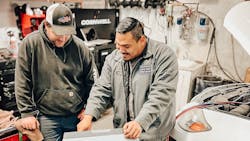
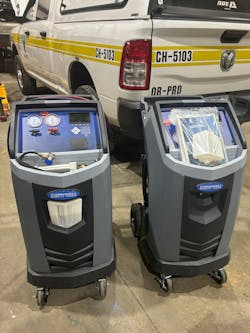
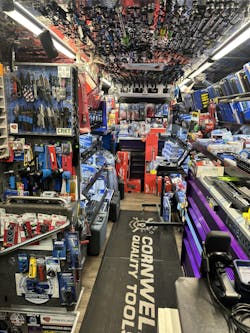
![“[Shops] never know when the equipment is gonna go down,” Valdovinos says, “and having the peace of mind that, ‘I'm still under warranty, so I just have to call my dealer, and my dealer will take care of me,’ is important.” “[Shops] never know when the equipment is gonna go down,” Valdovinos says, “and having the peace of mind that, ‘I'm still under warranty, so I just have to call my dealer, and my dealer will take care of me,’ is important.”](https://img.vehicleservicepros.com/files/base/cygnus/vspc/image/2025/02/67abd0571c2469e0fe8ce999-elias.png?auto=format,compress&fit=max&q=45&w=250&width=250)
